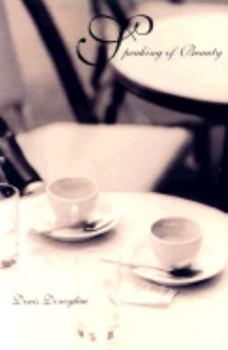Speaking of Beauty
Select Format
Select Condition 
Book Overview
A foremost critic of the English language here reflects on beauty and the language that it inspires in authors from Kant to Keats, Hawthorne to Housman. "An excellent and eloquent book."--James Wood,... This description may be from another edition of this product.
Format:Hardcover
Language:English
ISBN:0300098936
ISBN13:9780300098938
Release Date:April 2003
Publisher:Yale University Press
Length:209 Pages
Weight:0.45 lbs.
Dimensions:0.8" x 5.8" x 8.5"
Customer Reviews
1 rating
Beauty Disclosed
Published by Thriftbooks.com User , 21 years ago
Denis Donoghue has launched a rescue mission: he wants to reclaim our attention to the idea and representation of "beauty" (which is often shackled by scare-quotes because of its dubious status in our culture). Donoghue's brief but evocative book is necessary because "beauty" has been debased by advertisers (for whom it is merely the most effective way to touch a consumer's heart and wallet) and removed from academic studies by certain philosophers and literary critics who reject it as an outmoded concept. Fortunately, Donoghue suggests the many ways in which he and _we_ still find beauty, particularly in literature.The center of the book is the chapter "The Force of Form," in which Donoghue confesses, "I don't see any difference between beauty and formal perfection: whatever can be said about the one can be said with equal point about the other." Though some have grown suspicious of beauty as a "formal" matter, those who "want pure phenomena in which no act of mind is involved," Donoghue reminds us that our approach to a work (and our recognition of its beauty) is typically "formal," even if we do not acknowledge it as such. "Form" need be a four-letter pejorative only for iconoclasts; the rest of us may agree with Pierre Bourdieu that "a power must be affirmed that belongs to art to constitute everything aesthetically by virtue of form."Although many writers, critics, and philosophers make cameo appearances in this work, two in particular seem to constitute the poles between which Donoghue shuttles so deftly. One is Paul de Man, who "regularly spoke of beauty and the aesthetic as his enemies, all the more sinister for their pretending to be innocuous," and who was "a grim reader, hostile as on principle to any sign of inventiveness, wit, the gypsy phrase, or memorable cadence." (Though Donoghue wisely avoids emphasizing de Man's checkered past, such as his pro-Fascist journalism during WWII, before he became a distinguished professor of comparative literature at Yale, the reader might wonder of what duration was de Man's opposition to beauty.) On the other side is beauty's former champion, John Ruskin, to whom Donoghue devotes his final chapter. For Ruskin, beauty was essential (in the sense of "essence") in life; yet he saw that the artist's achievement of beauty can be a complicated process, "an intrication of forms, reaching a state of rest in the end but only after conflicts of principle, good and evil, roses and cankerworms." Ruskin realized that to be receptive to beauty, one must have a special "disposition" ("dispositions which require to be created," as he wrote in his essay "The Mystery of Life and Its Arts"), a state of mind that is difficult for many to develop and maintain in our age. In presenting the various ways that writers and critics have responded to beauty (as represented "form" and as idea), Donoghue reintroduces a discussion that has a lengthy history: he has achieved something about which he wrote in an earlier work, FE





